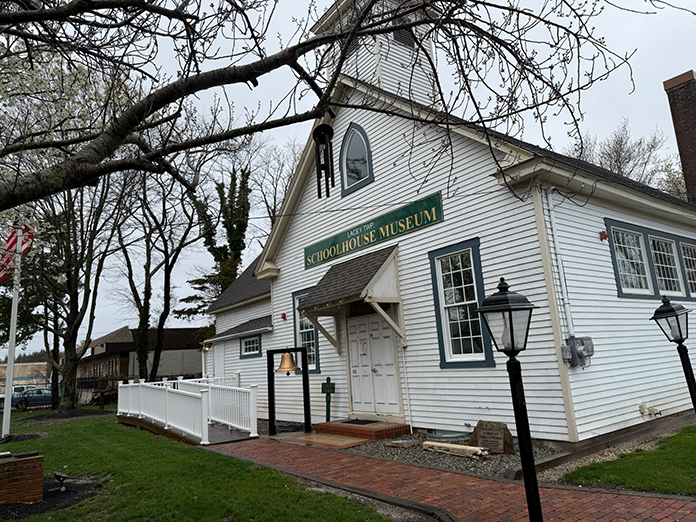TOMS RIVER – The World Bee Celebration, hosted by Bee Shore Honey, LLC and Save Barnegat Bay, created a hive of activity as local experts, beekeepers, and environmental enthusiasts gathered to celebrate and highlight the crucial role of pollinators.
While bees were the main buzz, the event also spotlighted bats, emphasizing their significant contributions alongside bees in the local ecosystem.
A Marine Academy of Technology and Environmental Science (MATES) student from Island Heights championed the cause of bats as unsung pollinator superheroes. Eleanora Church’s project for her Girl Scout Gold Award focuses on building bat houses and educating the community on the vital role bats play.
“There are over 500 different types of flowers that rely on bats as one of their major pollinators,” Eleanor shared. “They can also eat approximately 3,000 mosquitos in just one night.”
With the assistance of two other Girl Scouts, Eleanor helped two young children build their own bat houses. She also addressed the threats bats face from white nose syndrome and habitat loss due to development.
Building Homes For Busy Bees
Bats weren’t the only ones to get new homes at the event, which featured stations showcasing many experts involved in the New Jersey State Beekeeping Association and its Ocean County Chapter.
Graceanne Taylor, an Environmental Educator from Save Barnegat Bay, led an engaging activity: crafting bee houses from simple materials like bamboo and twine. Taylor instructed participants to place the bee houses in spots exposed to morning sun and afternoon shade, creating an ideal bee environment.
Taylor explained that the bees will utilize these houses to create rooms for storing food, eggs, and pollen. She added that native bees are solitary creatures and prefer to live independently.
Bill McCormick of Bee Shore Honey, pursuing his master’s degree in beekeeping from Cornell University, offered valuable information about bees and honey. Bill’s wife Ann and daughter Bridget joined him as groups swarmed to a particularly popular attraction hosted by the McCormick family.
Guests cast aside any fear of stings and donned protective white suits for a once-in-a-lifetime opportunity: a closer look at a real beehive. This firsthand encounter allowed them to witness these amazing creatures buzzing about in their natural environment.
A separate display showcased hundreds of bees buzzing within a transparent observation hive encased in a wooden frame. The bee condo offered a glimpse into the organized chaos of the hive. For some, the most thrilling part was searching for the queen bee, easily identified by a special green marking placed by the beekeepers, as she navigated the swarms of worker bees.
“Queen bees generally live about three years or rarely up to five years,” said Sheila Estlow of Manchester. “The queen bee’s only role is to lay eggs and can lay 1,500 a day.”
In contrast, worker bees only live approximately 42 days. Bees born before the end of the winter have a different body than those born at other times of the year. The ‘winter bees’ live until the spring because of their extra “fat.”
There are 4,000 species of bees throughout North America, and honeybees are the only ones who make honey.
The Importance Of Native Plants
New Jersey has crowned a Honey Queen in human form for several decades. Katie Culbert, the outgoing 2023 New Jersey Honey Queen, is set to graduate from Toms River North and begin her studies at Harvard University in the fall.
A research contest sponsored by the Army Educational Outreach program regarding pollinators first sparked Katie’s interest in bees. Her dedication to the topic earned her the Governor’s Award for Environmental Excellence, and her research on the critical link between native plant species and bee health has even sparked legislative action.
“In research I conducted at MIT, I learned that the types of plants they visit correlate with their health,” Katie said. “Bees who visit more native plants are likely healthier and stronger. But if they mainly forage off invasive plants, they’re weaker and most likely won’t survive through the winter.”
Katie shared her research with Assemblyman Alex Sauickie (R-12), who introduced A-5764 on November 30, 2023, aimed at prohibiting the planting of non-native species in landscaping at State parks and forests. The bill also establishes a grant program to support the use of native plants at local parks and forests, with an appropriation of $250,000. A companion bill, S-2859, was introduced in the Senate on March 4, 2024, sponsored by Senator Linda R. Greenstein (D-14).
The Sweet Side Of Pollination
“One out of every three bites of food you take is due to pollination,” stressed Katie. “A lot of our food supply and agriculture is highlight dependent upon honeybees.”
The impact of honeybees on food came with a taste test from Alyssa Suder, a Toms River Gardening Club member. Suder delighted attendees with a taste of homemade dandelion jelly, showcasing the sweetness of the plant often seen as a pesky weed.
“Many people don’t realize that every part of the dandelion is edible,” Suder explained. “Jelly is made just from the petals of the dandelion.”
“Bees are feeding on dandelions,” continued Suder. “So, the jelly actually tastes like honey – it’s a citrus honey taste.”
The post World Bee Day Celebrates Pollinators Of Every Stripe appeared first on Jersey Shore Online.


